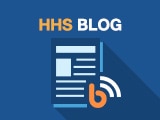Here’s What’s So Great about Community Health Centers
This Friday marks the end of National Health Centers Week, in which HHS and all Americans officially celebrate the wonderful work that is done across our country year-round by community health centers.
This has been a special week not just because it is a privilege to raise up the contributions of community health centers. It was also a chance for us to visit community health centers and see the special role that doctors, nurses, and others there play in providing care in people’s communities. As just the third Secretary of Health and Human Services to be a physician, seeing providers in action is always a special experience.
One of the first things to spark my interest in medicine was accompanying my grandfather on house calls, seeing how warmly he was welcomed by his patients. House calls are less common these days, but community health centers can offer patients the same kind of relationship: a welcoming place where patients can receive care from physicians they know and trust.
We saw this first-hand this week at a community health center not far from HHS headquarters in Washington: Unity Health Care’s Parkside Health Center. We also saw it when we had the chance to visit another community health center earlier this month, Peak Vista Health Center, all the way across the country in Colorado Springs, Colorado.

Parkside Health Center is one of 28 sites Unity operates in D.C., which provide care for more than 100,000 patients per year. They offer a full range of services, from check-ups with family doctors to dental care and referrals to specialists.

We got the chance to sit down for a while with some of Unity’s physicians, and it was so inspiring to hear them talk about the love they have for their patients, and how proud they are to serve the Northeast DC community.
As someone who spent a number of years working at a safety-net hospital in Atlanta, many of the issues they raised were familiar to me, including the importance of figuring out the best ways to attract physicians to underserved communities. They told me about why they love where they work: the “sense of mission, sense of joy” that they get from working with patients, which is so familiar to me as well.
We also talked about the role community health centers play in the three clinical priorities we’ve identified for HHS: the opioid crisis, serious mental illness, and childhood obesity.

They echoed what we have heard from so many other community leaders fighting the opioid crisis about the importance of connecting people struggling with addiction to treatment at critical points in time, like when they’re recovering from an overdose. We heard about the work Unity does to help young people in the community who have had an early psychosis episode to get care from a psychiatrist—a crucial step in treating serious mental illness. Further, Unity has done plenty to help promote active lifestyles and healthy eating within the community, even holding programs for families to teach cooking skills and provide access to fruits and vegetables.
Winning each of these important fights is going to require the kind of local commitment and understanding that community health centers so wonderfully provide.
Community health centers are able to provide free or low-cost care thanks to the generosity of their communities and local governments, as well as significant support from HHS’s Health Resources & Services Administration (HRSA).
This week, in fact, HRSA announced $105 million in new grants for 1,333 community health centers across the country. The grants are focused on quality improvement, which typically means helping centers look at what they’re doing through data gathering and assessments, with a view toward improving practices to deliver better care for patients.
Next month, HHS will be announcing another big set of grants, around $195 million worth, focused on helping health centers tackle substance abuse and mental health issues, with a particular focus on the opioid crisis.
The more than 1,400 community health centers across America operate more than 10,000 health care delivery sites, providing care to more than 25 million Americans every year. That’s 1 in 10 American kids, 1 in 6 Americans living in rural areas, and 1 in 3 Americans living in poverty.
It was such a privilege to get to see a couple of those centers in action, and meet the doctors, nurses, and support staff who maintain this vital safety net for their communities. We look forward to providing the best ongoing support we can for the important work they do.
#HealthCenters are key to #HHS clinical priorities: opioid crisis, serious mental illness, childhood obesity https://go.usa.gov/xRvzQ #NHCW17
#IAmHHS: Seeing People for Their Strengths, Not Their Weaknesses
Leveraging FDA Resources - Encourage Students Pursue STEM Careers


